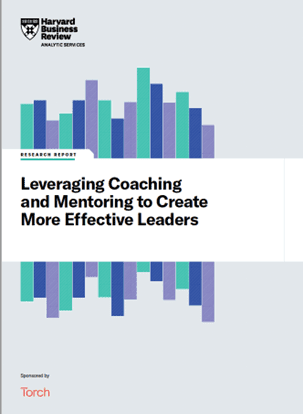There can be few leadership development consultants who deliver executive coaching, nor corporate OD and L&D specialists who commission coaching, nor the countless senior leaders who have benefitted from coaching, who would doubt the value of coaching in leadership development. Many studies have addressed its ROI and the growing financial commitment to leadership coaching of corporates, scale-ups, and start-ups, for whom value-added to the bottom-line is a key driver, reflects the perceived value of the coaching ripple effect. Increasingly, however, it is being realised that the impact of coaching is not just on the leaders who receive it but is widely and powerfully evidenced across the organisation.
This is powerfully restated in a new report from Harvard Business Review Analytic Services Leveraging Coaching and Mentoring to Create More Effective Leaders.

The report, sponsored by the professional training and coaching company, Torch, begins by reminding us that “Organizations with strong leadership development point to great leadership as key to their sustained business success”. An interesting array of data is introduced to reinforce the central importance of great leadership in enabling organisations to navigate the complex contemporary landscape. For example, 89% of the 665 business executives surveyed globally by Harvard Business Review Analytic Services in August 2022 agree that organizations with best-in-class leaders are more likely to be successful. Almost the same number of executives (90%) say that it’s important to provide leadership development more broadly across their organizations.
Dani Johnson, co-founder and principal analyst for RedThread Research, a California-based HR research firm reminds us of the dramatically changing shape of leadership development. “Organizations are starting to realize that leadership development goes way beyond the leadership programs that used to be. We’ve heard all kinds of things about support for leaders that we haven’t heard in the past. Leadership development isn’t just a one-time two-week course and then you level up. Leadership is a deeper challenge, and they need consistent support.”
The report separates the 665 survey respondents into 3 categories – leaders, followers, and laggards – depending on how they self-assess on the success of their leadership development programs. The leaders group makes intense use of coaching (70%) and mentoring (75%) within their professional development programs. The followers group deploys substantially less coaching (52%) and mentoring (68%) with laggards less still – 40% coaching and 47% mentoring. This data is reinforced by how these groups rate coaching interventions as being key to the success of the leadership development – leaders, 71%; followers, 64%; laggards, 33%.
The changing business landscape is forcing change in our approach to leadership development. First-hand accounts from global leaders reinforce the point. “There is a broad realization that great leaders, mentors, and coaches help companies achieve better performance. [Great leadership is] a business imperative. It’s a value proposition. It drives financial outcomes and provides organizations with a strategic edge in the talent marketplace.”
The breadth of the systemic impact of leadership is reinforced by Prof George Kohlrieser, Professor of leadership and organizational behaviour, from Lausanne Institute for Management Development who has written “Great leaders become a secure base for others by creating trust and by providing energy and support to encourage their employees to take risks and seize new opportunities.”
A particularly important insight arises from the analysis of the relative impact of traditional skills-based training with the relational leadership development opportunities offered by coaching.

The report makes an important observation about quality versus quantity: “Those in the leaders group not only teach more skills—an average of six compared to five for followers and three for laggards—but are more likely to cover the less concrete and strategic skills required to meet today’s leadership mandates.”
Deeper analysis of the range of leadership skills impacted by coaching makes compelling reading.

The gap in skills fostered within their teams between the leaders, followers and laggards is evident across the entire skills base, but note how it is widest in terms of fostering an innovation culture. This has deep significance for most organizations as they prepare to navigate a complex innovation landscape.
Of course, the emergence of digital platforms – of which Torch is a prime example – has been a great enabler for organisations of all sizes to access excellent coaching and mentoring resource, thereby increasing ease of use and democratising access to coaching.
There is substantial evidence here to convince organisations of the ROI of coaching and ever-more opportunities to access it at high quality but a moderate cost. The question for organisations in the laggards category is not so much ‘Can I afford to’ but more, ‘Can I afford not to’.


